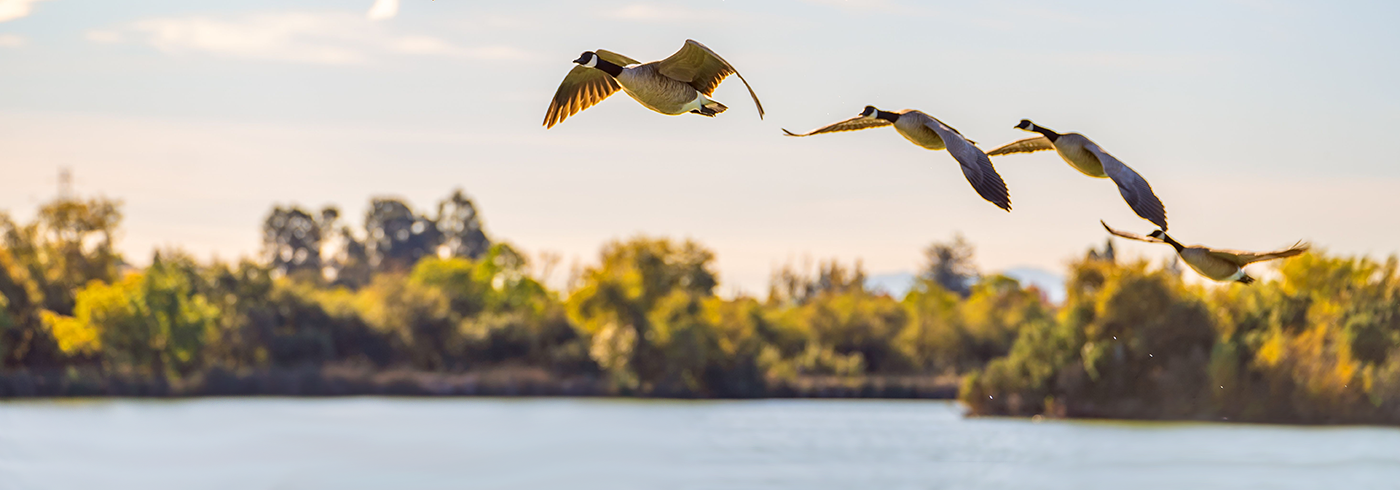
Avian Influenza
What is avian influenza?
Avian influenza, also known as bird flu is a disease caused by a virus that primarily infects domestic poultry and wild birds such as geese, ducks, and shore birds. Each year, there is a bird flu season, and some forms of the bird flu are worse than others. Wild birds, especially waterfowl, are a natural host for mild strains of avian influenza. Highly pathogenic avian influenza (HPAI) H5N1 is a strain that can kill both wild birds and commercial poultry.
Avian influenza can also be transmitted to other animals such as dairy cattle, dogs, cats and other wild animal species through direct or indirect contact with the respiratory secretions or feces of infected birds.
In March 2022, the HPAI H5N1 virus was found in Ontario in wild and commercial poultry. This same strain of the virus has also been found in many other parts of the world, including other Canadian provinces and American states. The spread is mostly due to the movement of infected wild birds.
The HPAI H5N1 virus does not easily jump from animals to humans, and the current strain has a lower than normal concern for spread to people.
Facts about... Avian influenza
What is the current situation?
On November 9, 2024, British Columbia reported the first domestically acquired human case of influenza A(H5N1) in Canada. An infected animal or bird is thought to be the source of the infection. The virus has been detected in many species, including wild birds, commercial poultry, and in small wild animals including skunks and foxes. The Public Health Agency of Canada says that the risk of avian influenza infection for the public remains low at this time.
To date, there have been no cases of HPAI in cattle or other livestock species in Ontario or Canada.
There have been no human cases of avian influenza in Durham Region.
Durham Region residents should:
- Stay away from wild birds.
- Avoid unprotected contact with domestic birds that appear to be sick or have died.
- Avoid contact with surfaces that appear to be contaminated with feces from wild or domestic birds.
- Wash hands thoroughly with soap and water immediately after unavoidable contact with birds or their droppings.
- Practice safe food handling and cooking practices for poultry and eggs.
- Not consume unpasteurized (raw) milk or raw milk products.
- Report sick or dead wild birds that are on municipal property to your local municipality and on the Canadian Wildlife Health Cooperative online reporting tool.
- Do not attempt to rescue birds in distress.
Signs of avian influenza in birds
- Lack of energy or movement
- Nervousness, tremors or lack of coordination
- Swelling around the head, neck and eyes
- Coughing, gasping for air or sneezing
- Diarrhea
- Sudden death
Frequently asked questions
| What should I do if I find dead birds on private property? |
|
Check with your local municipality for approved methods of disposing of dead birds. If your municipality allows, residents can bury or double bag dead birds and place in garbage for your regular garbage pick-up. Large numbers of dead wild birds should be managed as instructed by the Canadian Wildlife Health Cooperative. Report sick or dead wild birds on the Canadian Wildlife Health Cooperative online reporting tool. When handling dead birds:
|
| What should I do if I find dead birds on municipal property? |
|
Report to your local municipality for pick-up: |
| How do I report any dead or sick bird sightings? |
|
| What are some recommendations for pet owners? |
|
| Are there any recommendations when feeding wild birds in my backyard? |
|
| How can I protect domestic and captive birds? |
|
| Are poultry, beef, eggs and milk safe to eat? |
|
| Who conducts wild bird surveillance? |
|
Wild bird surveillance is conducted through a collaboration between:
|
| Who is monitoring potential positive cases in birds at poultry farms/agricultural environments? |
|
| How do I protect myself while being active outside? |
|
Always stay away from wild animals. Reduce your risk by:
|
| How do I protect myself while at work and working outside? |
Additional occupational resources
Canadian Centre for Occupational Health and Safety (CCOHS) e-Courses (free) |
Other resources
Contact Us




